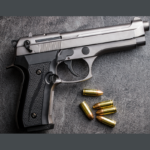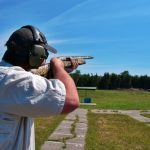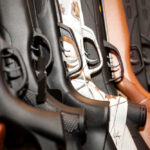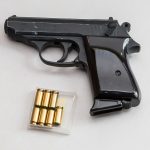The Law, Defences and Penalties for Unauthorised Use or Possession of Firearms in NSW
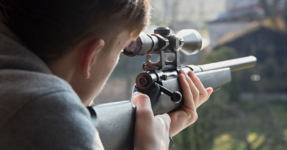
A man has been arrested after police allegedly found a modified firearm and drug precursors in his car.
According to police, officers attached to the State Crime Command’s Drug and Firearms Squad were patrolling the suburb of Concord in Sydney’s inner-west at around 3.30pm on 28 December 2022 when they observed the 36-year old discard a car key and small resealable bag on Patterson Street.
They claim this aroused a suspicion on reasonable grounds that the man had committed a crime and performed a search on that basis on a Volkwagen utility he had allegedly parked nearby.
Police are required to have a ‘reasonable suspicion’ before a person or vehicle can be searched without a warrant or the person’s informed consent.
Police say that, during the search, they located a modified firearm inside a duffle bag, a firearm magazine, ammunition and precursor chemicals believed to be used in the manufacture of illicit drugs.
The man was arrested and charged with unauthorised possession of a firearm, acquiring a prohibited firearm and ammunition subject to a firearms prohibition order, supplying a commercial quantity prohibited drug, possessing a prohibited drug and resisting police in execution of duty.
He will face Burwood Local Court to answer to the charges, which may be defensible on grounds including the requirement of possession and seemingly tenuous basis for the search.
The offence of unauthorised use or possession of a firearm in New South Wales
Unauthorised possession or use of a firearm is an offence under Section 7A of the Firearms Act 1996 which carries a maximum penalty of 5 years in prison.
To establish the offence, the prosecution must prove beyond reasonable doubt that:
- You possessed or used a firearm, and
- You were not authorised to do so by a permit or licence.
What amounts to possession?
Section 4 of the Act provides that you are in ‘possession’ if:
- You have custody of the firearm, or
- You have it in the custody of another person, or
- It is in or on any premises, place, vehicle, vessel or aircraft, whether or not belonging to or occupied by you.
Section 4A of the Act makes clear that possession includes where the item is in or on any premises you own, lease or occupy, or in your care, control or management, unless you satisfy the court that:
- It was placed in or on, or brought into or onto, the premises by or on behalf of a person who was authorised to do so, or
- You did not know and could not reasonably be expected to have known that it was in or on the premises, or
- The evidence otherwise establishes that you were not in possession of the firearm.
What is a premises?
‘Premises’ is defined broadly as any place, vehicle, vessel or aircraft.
What is a firearm?
Section 4 of the Act defines a ‘firearm’ as a gun, or other weapon, that is or was capable of propelling a projectile by means of an explosive, and includes a blank fire firearm, or an air gun, but does not include a paintball marker.
Imitation firearms
Section 4D makes clear that the definition extends to ‘imitation firearms’ which are objects that, regardless of colour, weight or composition, or the presence or absence of any moveable parts, substantially duplicate in appearance a firearm, but are not firearms.
Children’s toys
The definition does not, however, extend to items produced and identified as children’s toys.
The offence of unauthorised use or possession of a pistol or prohibited firearm in NSW
Unauthorised possession or use of a pistol or prohibited firearm is an offence under section 7 of the Firearms Act 1996 which carries a maximum penalty of 14 years in prison.
To establish the offence, the prosecution must prove beyond reasonable doubt that:
- You possessed or used a pistol or prohibited firearm, and
- You were not authorised to do so by a permit or licence.
The definitions regarding possession, premises and firearm that apply to section 7A also apply to this offence.
What is a pistol?
A ‘pistol’ is a firearm that:
- is reasonably capable of being raised and fired by one hand, and
- does not exceed the dimensions prescribed by the regulations.
What is a prohibited firearm?
Schedule 1 of the Act contains a long list of ‘prohibit firearms’, which include:
- Machine guns, sub-machine guns and other automatic weapons capable of shooting bullets in rapid succession,
- Self-loading shotguns, rim-fire and centre fire rifles,
- Firearms capable of discharging liquid, powder, gas, chemicals, flares or dye
- Canons and powerheads, and
- Firearms disguised as other items, such as walking sticks.
Legal defences to firearms charges
If you are charged with a firearms offence and are able to raise evidence of a legal defence, the onus then shifts to the prosecution who must prove beyond all reasonable doubt that the defence does not apply to the circumstances of your case.
If it is unable to do so, you are entitled to an acquittal; in other words, a verdict of not guilty.
Legal defences to forearms offences include self-defence, duress and necessity.
Self-defence is where you believed your actions were necessary to defend yourself or another person, or to prevent the unlawful deprivation of your liberty or that of another person, or to protect your property from being taken, destroyed, damaged or interfered with, or to prevent criminal trespass to your land, or remove a person criminally trespassing, and your conduct was a reasonable response to the circumstances as you perceived them at the time.
Duress is where your conduct arose due to an imminent threat made to you or someone close to you, in circumstances where the threat was continuing and serious enough to justify your actions.
Necessity is where you engaged in your actions to avoid serious, irreversible consequences to you or someone you were bound to protect, you honestly and reasonably believed you or the other person were immediate danger and your actions were a reasonable and proportionate response to the danger.
Going to court for a firearms offence?
If you have been accused of a firearms offence and are going to court, call Sydney Criminal Lawyers anytime on (02) 9261 8881 for strong representation by an experienced criminal defence team who will explain your options, the best way forward and fight for the optimal outcome in your case.

